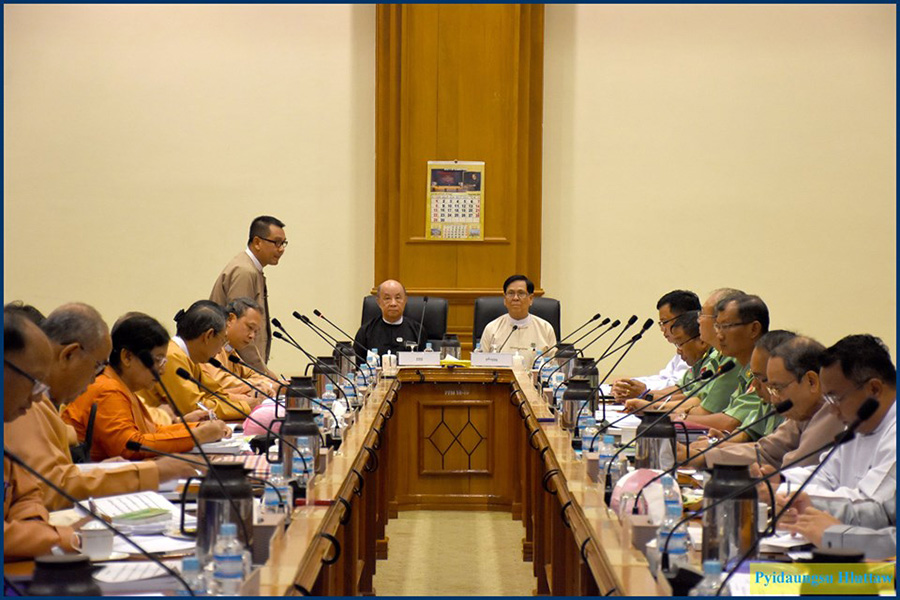YANGON—Three lawmakers from the Arakan National Party (ANP) and the National United Democratic Party (NUD) resigned from the 45-member Constitutional Amendment Committee this week to voice their disapproval with the panel’s process for drafting the amendment bill.
ANP lawmaker U Pe Than said the party’s Central Executive Committee decided to withdraw its members from the amendment committee, as it no longer has any confidence in the process of selecting the amendment proposals that will be forwarded to Parliament for a vote.
He said changes to the Constitution proposed by ethnic parties including the ANP were rejected during the committee’s debates.
The 45-member committee—which includes members of 14 political parties, independents and representatives of the military’s 25 percent bloc in Parliament—compiled more than 3,700 recommended changes to the Constitution collected from the various parties.
The recommendations include reducing the role of the military and its commander-in-chief in politics, decentralizing state power and ensuring equality and the rule of law for all citizens in the military-drafted Constitution.
This month, the committee began reviewing all of the proposed changes put forward by each party in order to draft a bill, which will be submitted to Parliament.
U Pe Than said the party’s representatives were unhappy with the voting system used by the committee to determine which of the proposed changes would be adopted in the bill. To be included, proposals currently require the support of a majority of committee members in an open vote. Given the dominance of the ruling National League for Democracy on the committee, the ANP had requested that a new system be adopted, but their request was rejected. According to U Pe Than, his party has suggested negotiating the merits of each proposal, using a secret vote, or limiting each party to one vote, but these ideas were rejected.
“If they decide using a majority vote system, the draft bill will only reflect the NLD’s wishes,” he said.
The ANP’s announcement that it was quitting the committee came one day after the NUD took the same step.

NUD chairperson U Sein Win announced his resignation from the committee on Monday, saying he could not accept a draft constitutional amendment bill so heavily influenced by a single big party. U Sein Win is also a Lower House lawmaker representing Maubin Township in Irrawaddy Region. He is the NUD’s sole lawmaker.
He told The Irrawaddy on Monday he had requested that a secret ballot be used to select amendments for the bill, but the ruling party had insisted on a show of hands.
On Monday, as lawmakers conducted their final debate on proposed amendments to Chapter 1 of the Constitution, the NLD’s amendment proposals were passed.
“I don’t want to waste my time nodding my head and putting my hand up. That’s why I resigned,” said U Sein Win.
U Sein Win contested and won a seat in the 2015 general election as an NLD candidate. However, he resigned from the ruling party last year to found the NUD.
However, NLD lawmaker U Aung Kyi Nyunt, who is also a member of the Constitutional Amendment Committee, said that after the ethnic parties complained about the open voting, the committee had agreed that from now on, important matters would be decided through a secret vote.
“The ethnic parties discussed the voting system on Monday. Some proposed an open vote, and some proposed a secret system,” said lawmaker Mai Ohn Khaing of the Pa-O National Organization.
The NLD has been at odds with some of the ethnic parties, especially on the issue of reducing the military’s role in politics. The NLD has proposed a gradual reduction in the 25 percent of parliamentary seats constitutionally reserved for unelected military lawmakers—considered a pragmatic approach—while the ethnic parties have proposed removing the military from Parliament in one fell swoop.
The formation of the committee was the NLD’s first official attempt to amend the military-drafted Constitution since it took power in 2016. The military and its proxy party the USDP have objected to the committee as unconstitutional.

















